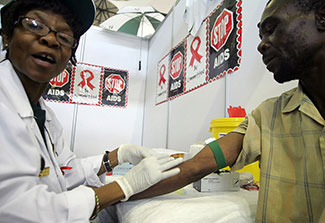
Fogarty launches program to reduce HIV/AIDS stigma, lower disease transmission
July / August 2018 | Volume 17, Number 4

Paballo Thekiso/AFP/Getty Images

Paballo Thekiso/AFP/Getty Images
A new Fogarty program aims to reduce stigma, which is a
significant barrier to HIV testing and treatment in many
low-resource settings.
significant barrier to HIV testing and treatment in many
low-resource settings.
Despite increasingly effective methods of treating and preventing HIV/AIDS, stigma deters many from seeking testing or care, and is a significant contributor to continued disease transmission. That’s why Fogarty has launched aresearch program to spur development of innovative interventions to reduce stigma in low- and middle-income countries (LMICs), including among populations that are particularly vulnerable or marginalized, such as adolescent girls, people who inject drugs, and children and caregivers of those living with HIV.
Fogarty and NIH funding partners plan to invest about $3 million over two years to support collaborations between U.S. and LMIC investigators in six African countries, as well as Haiti, Nepal and Ukraine.
“Despite practices and medications that can reduce the risk of infection and keep the virus in check, HIV and AIDS persist around the world,” said Fogarty Director Dr. Roger I. Glass. “Stigma research presents an opportunity to find new strategies for preventing the spread of disease and improving treatment outcomes and quality of life for people living with HIV/AIDS.”
The nine awards reflect the diversity of populations affected and the additional stigma some may face associated with drug and alcohol abuse, mental health problems, tuberculosis and other co-infections, and gender or lifestyle choices.
Several projects focus on HIV-positive women who are pregnant or postpartum and may not seek care or stick with the antiretroviral therapy (ART) that both improves their health and reduces mother-to-child transmission. Young South African women, a group known to disengage from care, will be the focus of a University of Cape Town project to study a peer-support intervention, coupled with a mobile health platform. In Botswana, New York University plans to conduct a randomized controlled trial to assess the effectiveness of a peer-led stigma program on both the mother’s ART adherence postpartum and her infant’s health. Duke University researchers working in Tanzania will study an approach that reaches women at their first antenatal visit and provides counseling before HIV testing, and after, if they are HIV positive. And in Haiti, an intervention will be developed and studied that would enable doctors, nurses and midwives in the health system and birth attendants in the community to mitigate stigma in their respective environments, with support from a grant to the University of Maryland, Baltimore County.
Children and adolescents with HIV/AIDS are the focus of an Indiana University project in Kenya that will evaluate a multimedia training curriculum for teachers aimed at reducing stigma in classrooms. An underserved yet key population, transwomen, will be studied to explore the impact of anti-trans, HIV and sex worker stigma in Nepal, under a grant to the nonprofit Public Health Foundation Enterprises. Meanwhile, University of Botswana researchers will develop and study an intervention in Gabarone to destigmatize and encourage HIV testing among financially successful men over age 40, whose income and education are associated with multiple partners and other risky behavior.
In Ukraine, a Johns Hopkins University project will use a statistical method known as latent class analysis to understand the layered identities of female injection drug users who are HIV-positive. Finally, reducing the dual stigma of HIV/AIDS and tuberculosis, and improving treatment outcomes, is the goal of a grant to Columbia University for research in South Africa.
A 2017 workshop on the science of stigma reduction hosted by Fogarty’s Center for Global Health Studies helped lay the foundation for the new grant program.
NIH’s National Institute of Mental Health (NIMH) and National Cancer Institute (NCI) are funding partners on the awards.
Fogarty previously funded related research through its Stigma and Global Health Research Program.
2018 awards for Reducing Stigma to Improve HIV/AIDS Prevention, Treatment and Care in LMICs
- Columbia University Health Sciences
Impact of a multimodal intervention to reduce dual stigma and improve treatment outcomes in HIV/Drug-resistant TB co-infected patients in KwaZulu-Natal, South Africa
Principal Investigators: Max O’Donnell, (contact), Kathy Rivet Amico - Duke University
A stigma reduction intervention at time of entry into antenatal care to improve PMTCT services in Tanzania
Principal Investigators: Melissa H. Watt, Blandina Theophil Mmbaga - Indiana University-Purdue University at Indianapolis
The Teach HADITHI teacher training intervention to reduce classroom HIV-related stigma in Kenya
Principal Investigator: Rachel Christine Vreeman - Johns Hopkins University
Using latent class analysis to understand the role of layered stigma on engagement in care among HIV positive women who use drugs in Ukraine
Principal Investigator: Jill Owczarzak - New York University
RCT to reduce stigma and improve treatment adherence in HIV+ pregnant women in Botswana
Principal Investigator: Lawrence H. Yang - Public Health Foundation Enterprises
Reducing intersectional stigma through increased social participation among transwomen in Nepal
Principal Investigator: Erin Meek - University of Botswana
Innovative HIV Testing Strategy for Middle-to-Upper Income Men in a Resource Limited Setting
Principal Investigator: Mosepele Mosepele - University of Cape Town
Peer support to mitigate the impact of stigma in young HIV+ pregnant & postpartum women
Principal Investigator: Benjamin Landon Myer - University of Maryland, Baltimore County Campus
Preventing HIV/AIDS by Building Capacity to Reduce Stigma Among Providers for Pregnant Women in Rural Haiti
Principal Investigator: Jasmine Abrams
More Information
To view Adobe PDF files, download current, free accessible plug-ins from Adobe's website .


































No hay comentarios:
Publicar un comentario